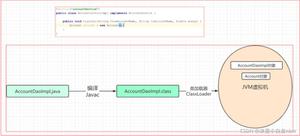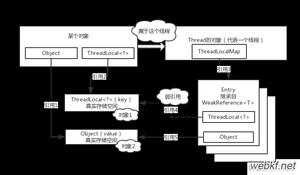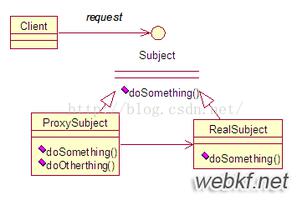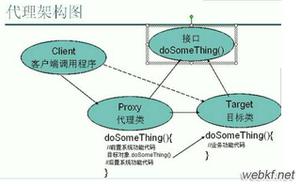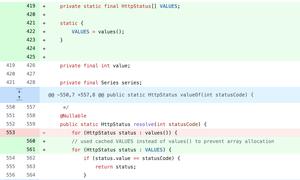java动态代理例子

1 先看一个简单点动态代理的例子(没有用到factory)
2 1 定义接口
3 package com.dynamic.simple;
4
5 import com.dynamic.simple.Subject;
6
7 public interface Subject{
8 public void request();
9 }
10
11 2 实现真实类
12 package com.dynamic.simple;
13
14 public class RealSubject implements Subject{
15 public RealSubject(){}
16 public void request() {
17 System.out.println("From real subject.");
18 }
19 }
20
21 3 定义动态代理
22 package com.dynamic.simple;
23
24 import java.lang.reflect.Method;
25 import java.lang.reflect.InvocationHandler;
26 public class DynamicSubject implements InvocationHandler {
27 private Object sub;
28
29 public DynamicSubject() {
30 }
31
32 public DynamicSubject(Object obj) {
33 sub = obj;
34 }
35
36 public Object invoke(Object proxy, Method method, Object[] args) throws Throwable {
37 System.out.println("before calling " + method);
38 method.invoke(sub,args);
39 System.out.println("after calling " + method);
40 return null;
41 }
42 }
43
44 4 客户端
45 package com.dynamic.simple;
46
47 import java.lang.reflect.InvocationHandler;
48 import java.lang.reflect.Proxy;
49
50 public class Client{
51 static public void main(String[] args) throws Throwable{
52 RealSubject rs = new RealSubject(); //在这里指定被代理类
53 InvocationHandler ds = new DynamicSubject(rs); //初始化代理类
54 Class cls = rs.getClass();
55 Subject subject = (Subject) Proxy.newProxyInstance(cls.getClassLoader(), cls.getInterfaces(),ds );
56 subject.request();
57 }
58 }
运行客户端结果为:
before calling public abstract void com.dynamic.simple.Subject.request()
From real subject.
after calling public abstract void com.dynamic.simple.Subject.request()
1 下面看一个复杂点的动态代理实现(用到了factory)
2 1 定义接口
3 package com.proxy;
4
5 import com.proxy.SomeClass;
6 import com.proxy.SomeClassImpl;
7
8 public interface SomeClass {
9 public void someMethod();
10
11 public void someOtherMethod(final String text);
12 }
13
14 2 定义实现类
15 package com.proxy;
16
17
18 public class SomeClassImpl implements SomeClass{
19 private String name;
20
21 public SomeClassImpl(final String name){
22 this.name = name;
23 }
24
25 public void someMethod(){
26 System.out.println(this.name);
27 }
28
29 public void someOtherMethod(final String text){
30 System.out.println(text);
31 }
32 }
33
34 3 定义2个代理SomeClassProxy和SomeClassCountingProxy(静态代理时才需要)
35 /*SomeClassProxy*/
36 package com.proxy;
37
38
39 public class SomeClassProxy implements SomeClass{
40
41 private final SomeClassImpl impl;
42
43 public SomeClassProxy(SomeClassImpl impl){
44 this.impl = impl;
45 }
46
47 public void someMethod(){
48 this.impl.someMethod();
49 }
50
51 public void someOtherMethod(final String text){
52 this.impl.someOtherMethod(text);
53 }
54 }
55
56 /*SomeClassCountingProxy*/
57 package com.proxy;
58
59
60 public class SomeClassCountingProxy implements SomeClass{
61 private final SomeClassImpl impl;
62
63 private int invocationCount = 0;
64
65 public SomeClassCountingProxy(SomeClassImpl impl){
66 this.impl = impl;
67 }
68
69 public void someMethod(){
70 this.invocationCount ++;
71 this.impl.someMethod();
72 }
73
74 public void someOtherMethod(final String text){
75 this.invocationCount ++;
76 this.impl.someOtherMethod(text);
77 }
78
79 public int getInvocationCount() {
80 return invocationCount;
81 }
82
83 public void setInvocationCount(int invocationCount) {
84 this.invocationCount = invocationCount;
85 }
86 }
87
88 4 定义工厂
89 package com.proxy;
90
91 import java.lang.reflect.InvocationHandler;
92 import java.lang.reflect.Proxy;
93
94
95 public class SomeClassFactory {
96 /*//static proxy
97 public static final SomeClass getStaticSomeClassProxy(){
98 SomeClassImpl impl = new SomeClassImpl(System.getProperty("user.name"));
99 if (false) {//generally when debuging
100 return new SomeClassCountingProxy(impl);
101 } else {
102 return new SomeClassProxy(impl);
103 }
104 }
105 */
106
107 //dynamic proxy
108 public static final SomeClass getDynamicSomeClassProxy(){
109 SomeClassImpl impl = new SomeClassImpl(System.getProperty("user.name"));
110 ClassLoader loader = SomeClassImpl.class.getClassLoader();
111 Class[] interfaces = new Class[] {SomeClass.class};
112 InvocationHandler handler = new MethodCountingHandler(impl);
113 SomeClass proxy = (SomeClass)Proxy.newProxyInstance(loader, interfaces, handler);
114 return proxy;
115 }
116 }
117
118 5 定义InvocationHandler,主要通过这个类实现动态代理功能及其扩展
119 package com.proxy;
120
121 import java.lang.reflect.InvocationTargetException;
122 import java.lang.reflect.InvocationHandler;
123 import java.lang.reflect.Method;
124
125
126 public class MethodCountingHandler implements InvocationHandler{
127
128 private final Object impl;
129 private int invocationCount = 0;
130
131 public MethodCountingHandler(final Object impl){
132 this.impl = impl;
133 }
134
135 public int getInvocationCount(){
136 return invocationCount;
137 }
138
139 @Override
140 public Object invoke(Object proxy, Method method, Object[] args)
141 throws Throwable {
142 try {
143 this.invocationCount++;
144 Object result = method.invoke(impl, args);
145 return result;
146 } catch (final InvocationTargetException e) {
147 throw e.getTargetException();
148 }
149 }
150 }
151
152
153 6 定义客户端
154 package com.proxy;
155
156 import java.lang.reflect.InvocationHandler;
157 import java.lang.reflect.Proxy;
158
159
160 public class DemoDynamic {
161
162 /**
163 * @param args
164 */
165 public static void main(String[] args) {
166 /*//no use factory
167 SomeClassImpl real = new SomeClassImpl(System.getProperty("user.name"));
168 InvocationHandler dynamic = new MethodCountingHandler(real);
169 Class clz = real.getClass();
170 SomeClass obj = (SomeClass)Proxy.newProxyInstance(clz.getClassLoader(), clz.getInterfaces(), dynamic);
171 obj.someMethod();
172 obj.someOtherMethod("test");
173 */
174
175 //use factory to get a real object
176 SomeClass obj = (SomeClass)SomeClassFactory.getDynamicSomeClassProxy();
177 obj.someMethod();
178 obj.someOtherMethod("test");
179
180 //the invocationhandler works as proxy function, extend the function of real object
181 InvocationHandler handler = Proxy.getInvocationHandler(obj);
182 if (handler instanceof MethodCountingHandler) {
183 System.out.println(((MethodCountingHandler)handler).getInvocationCount());
184 }
185 }
186 }
运行结果为:
Administrator
test
2
参照链接:
http://callan.javaeye.com/blog/161806
http://aronlulu.javaeye.com/blog/613461
http://blog.csdn.net/goodluckforlove/archive/2009/10/13/4663079.aspx
以上是 java动态代理例子 的全部内容, 来源链接: utcz.com/z/391813.html

